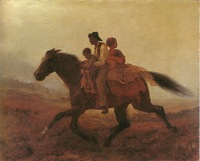Fugitive
Origin
Middle English, from Middle French & Latin; Middle French fugitif, from Latin fugitivus, from fugitus, past participle of fugere to flee; akin to Greek pheugein to flee
Definitions
- 1: running away or intending flight <a fugitive slave> <a fugitive debtor>
- 2: moving from place to place : wandering
- 3a : being of short duration
- b : difficult to grasp or retain : elusive
- c : likely to evaporate, deteriorate, change, fade, or disappear <dyed with fugitive colors>
- 4: being of transient interest <fugitive essays>
Description
A fugitive is a person who is fleeing from custody, whether it be from private slavery, a government arrest, government or non-government questioning, vigilante violence, or outraged private individuals. As a verbal metaphor and psychological concept, one might also be described as a "fugitive from oneself". Finally, the literary sense of "fugitive" includes the meaning of simply "fleeing". Interpol is the international authority for the pursuit of trans-border fugitives. Europol is the European authority for the pursuit of fugitives who are on the run within Europe, and coordinates their search, while national authorities in the probable country of their stay coordinate their arrest. In the United States, the U.S. Marshals Service is the primary law enforcement agency that tracks down federal fugitives, though the Federal Bureau of Investigation also tracks fugitives.
"On the lam"
"On the lam" or "on the run" often refers to fugitives. Mencken's The American Language and The Thesaurus of American Slang proclaim that lam, lamister, and "on the lam" — all referring to a hasty departure — were common in thieves' slang before the turn of the Twentieth century. Mencken quotes a newspaper report on the origin of 'lam' which actually traces it indirectly back to Shakespeare's time.
Its origin should be obvious to anyone who runs over several colloquial phrases for leavetaking, such as 'beat it' and 'hit the trail'. The allusion in 'lam' is to 'beat,' and 'beat it' is Old English, meaning 'to leave.' During the period of George Ade's 'Fables in Slang' (1900), cabaret society delight in talking slang, and 'lam' was current. Like many other terms, it went under in the flood of new usages of those days, but was preserved in criminal slang. A quarter of a century later it reappeared.
Mencken also quotes a story from the New York Herald Tribune in 1938 which reported that "one of the oldest police officers in New York said that he had heard "on the lam" thirty years ago."[1]
